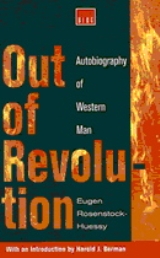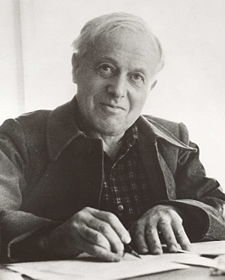
Out of Revolution
Encyclopedia
Out of Revolution is a book by Eugen Rosenstock-Huessy
(1888-1973), German social philosopher. The book counters conventional historiography as a “theory of history: how history should be understood, how historians should write about it,” as Harold J. Berman
wrote in the introduction to the book.
Page Smith
, Reinhold Niebuhr
, and Lewis Mumford
all wrote of the significance of this work having new insights on the history of Western Civilization
.
, through which he was forced to realize "that war was one thing to the soldiers of all nations and another thing to the people at home." His intention in writing, he says, is to "bequeath a lasting memory" of this experience to the next generations, with the design of overcoming a particular kind of inertia, a tendency to regard the sanity-shattering upheavals by which new epochs are initiated as though these only append a new chapter to the end of events that have passed. This tendency to analyze without sympathy the events even of one's own lifetime, Rosenstock-Huessy depicts as a willful and tragic forgetfulness. We must experience the rewriting of history in our lifetime, he said, because "the world's history is our own history"; otherwise, "it would be nothing but a hopeless library of dust".
 The central 'thesis' of Out of Revolution (also laid out in Die europaeischen Revolutionen, which adopts a different order and provides a more detailed theoretical casting of the material) was that the second millennium had created a planetary consciousness, though not yet a planetary peace. That consciousness had been formed from the great convulsions that occurred in Europe in what he terms the 'total revolutions.' Unlike rebellions or regime overthrows, 'total revolutions' are driven by a desire to achieve the longed for 'kingdom of heaven' - they are forms of the 'last judgment', in which one age is condemned and a new one erected to deliver the promise of the second coming. From Gregory VII's desire to revolutionize the Church—what Rosenstock-Huessy calls the Papal Revolution, and what is more commonly referred to as the investiture conflict—to Marx and Lenin's attempt to unify the workers of the world, Europe and then the World have been swept up by forces which were first unleashed in the struggles to end the unbearable injustices of the past and create the promised kingdom. Rosenstock-Huessy analyses the major contributions/ legacies of what he calls the 'secular revolutions'—the Russian, the French, the English and the German (the Reformation)—and the 'ecclesiastical' revolutions—a more complex array of forces which involves a detailed analysis of the Holy Roman Empire as he works his way, inter alia, through the investiture conflict, the war between Guelfs and Ghibbelines, the Italian warring states, the Italian Renaissance, the survival of the Austria-Hungarian empire, industrialisation and the founding of America and its subsequent revolution.
The central 'thesis' of Out of Revolution (also laid out in Die europaeischen Revolutionen, which adopts a different order and provides a more detailed theoretical casting of the material) was that the second millennium had created a planetary consciousness, though not yet a planetary peace. That consciousness had been formed from the great convulsions that occurred in Europe in what he terms the 'total revolutions.' Unlike rebellions or regime overthrows, 'total revolutions' are driven by a desire to achieve the longed for 'kingdom of heaven' - they are forms of the 'last judgment', in which one age is condemned and a new one erected to deliver the promise of the second coming. From Gregory VII's desire to revolutionize the Church—what Rosenstock-Huessy calls the Papal Revolution, and what is more commonly referred to as the investiture conflict—to Marx and Lenin's attempt to unify the workers of the world, Europe and then the World have been swept up by forces which were first unleashed in the struggles to end the unbearable injustices of the past and create the promised kingdom. Rosenstock-Huessy analyses the major contributions/ legacies of what he calls the 'secular revolutions'—the Russian, the French, the English and the German (the Reformation)—and the 'ecclesiastical' revolutions—a more complex array of forces which involves a detailed analysis of the Holy Roman Empire as he works his way, inter alia, through the investiture conflict, the war between Guelfs and Ghibbelines, the Italian warring states, the Italian Renaissance, the survival of the Austria-Hungarian empire, industrialisation and the founding of America and its subsequent revolution.
At the heart of this bifurcation into secular and ecclesiastical revolutions is a major and recurring idea in Rosenstock-Huessy's work: that the Great War (and after its outbreak he included the Second World War) is a Marriage of War and Revolution. That is, he saw that the great revolutions had created a 'circulatory spirit' forming the collective aspirations that had driven the European nations and their colonies to fight for one final peace which would lead to what he called a 'metanomical society,' a society in which there could exist a concordance of discordances, a peace in which differences could be not only be tolerated, but provide fecund tensions, as the fruits of all this struggle could be harvested. The European Union, for all its flaws, provides the kind of institutional resolution, which Out of Revolution was seeking.
For Rosenstock-Huessy, the millennium of revolution had been the outgrowth of the millennium in which the Church had been formed to create fellowship and love of the neighbor. The explosions of the revolutions were the angry acts of those who could no longer bear institutions they found hateful and divisive and contrary to the very commandments that had formed the Christian nations of Europe. For Rosenstock-Huessy, that the French and Russians would then turn upon Christianity itself was part of the demand of the 'Holy Spirit,' that love must ever find new forms. He held—or rather had faith—that the next millennium would be one in which Christianity would become incognito and the promised Johannine Age and its age of universal fellowship be realized.
considers this Rosenstock-Huessy’s greatest work in English. He wrote in his book, The Historian and History:
Reinhold Niebuhr
said of Out of Revolution:
Lewis Mumford
said of Out of Revolution:
Eugen Rosenstock-Huessy
Eugen Rosenstock-Huessy was a historian and social philosopher, whose work spanned the disciplines of history, theology, sociology, linguistics and beyond...
(1888-1973), German social philosopher. The book counters conventional historiography as a “theory of history: how history should be understood, how historians should write about it,” as Harold J. Berman
Harold J. Berman
Harold J. Berman was an American legal scholar who was an expert in comparative, international and Soviet/Russian law as well as legal history, philosophy of law and the intersection of law and religion...
wrote in the introduction to the book.
Page Smith
Page Smith
Charles Page Smith , who was known by his middle name, was a U.S. historian, professor, author, and newspaper columnist....
, Reinhold Niebuhr
Reinhold Niebuhr
Karl Paul Reinhold Niebuhr was an American theologian and commentator on public affairs. Starting as a leftist minister in the 1920s indebted to theological liberalism, he shifted to the new Neo-Orthodox theology in the 1930s, explaining how the sin of pride created evil in the world...
, and Lewis Mumford
Lewis Mumford
Lewis Mumford was an American historian, philosopher of technology, and influential literary critic. Particularly noted for his study of cities and urban architecture, he had a broad career as a writer...
all wrote of the significance of this work having new insights on the history of Western Civilization
Western culture
Western culture, sometimes equated with Western civilization or European civilization, refers to cultures of European origin and is used very broadly to refer to a heritage of social norms, ethical values, traditional customs, religious beliefs, political systems, and specific artifacts and...
.
Background
The book originated in his experience as a soldier during World War IWorld War I
World War I , which was predominantly called the World War or the Great War from its occurrence until 1939, and the First World War or World War I thereafter, was a major war centred in Europe that began on 28 July 1914 and lasted until 11 November 1918...
, through which he was forced to realize "that war was one thing to the soldiers of all nations and another thing to the people at home." His intention in writing, he says, is to "bequeath a lasting memory" of this experience to the next generations, with the design of overcoming a particular kind of inertia, a tendency to regard the sanity-shattering upheavals by which new epochs are initiated as though these only append a new chapter to the end of events that have passed. This tendency to analyze without sympathy the events even of one's own lifetime, Rosenstock-Huessy depicts as a willful and tragic forgetfulness. We must experience the rewriting of history in our lifetime, he said, because "the world's history is our own history"; otherwise, "it would be nothing but a hopeless library of dust".
Analysis

At the heart of this bifurcation into secular and ecclesiastical revolutions is a major and recurring idea in Rosenstock-Huessy's work: that the Great War (and after its outbreak he included the Second World War) is a Marriage of War and Revolution. That is, he saw that the great revolutions had created a 'circulatory spirit' forming the collective aspirations that had driven the European nations and their colonies to fight for one final peace which would lead to what he called a 'metanomical society,' a society in which there could exist a concordance of discordances, a peace in which differences could be not only be tolerated, but provide fecund tensions, as the fruits of all this struggle could be harvested. The European Union, for all its flaws, provides the kind of institutional resolution, which Out of Revolution was seeking.
For Rosenstock-Huessy, the millennium of revolution had been the outgrowth of the millennium in which the Church had been formed to create fellowship and love of the neighbor. The explosions of the revolutions were the angry acts of those who could no longer bear institutions they found hateful and divisive and contrary to the very commandments that had formed the Christian nations of Europe. For Rosenstock-Huessy, that the French and Russians would then turn upon Christianity itself was part of the demand of the 'Holy Spirit,' that love must ever find new forms. He held—or rather had faith—that the next millennium would be one in which Christianity would become incognito and the promised Johannine Age and its age of universal fellowship be realized.
Assessments of Out of Revolution
The historian Page SmithPage Smith
Charles Page Smith , who was known by his middle name, was a U.S. historian, professor, author, and newspaper columnist....
considers this Rosenstock-Huessy’s greatest work in English. He wrote in his book, The Historian and History:
Reinhold Niebuhr
Reinhold Niebuhr
Karl Paul Reinhold Niebuhr was an American theologian and commentator on public affairs. Starting as a leftist minister in the 1920s indebted to theological liberalism, he shifted to the new Neo-Orthodox theology in the 1930s, explaining how the sin of pride created evil in the world...
said of Out of Revolution:
Lewis Mumford
Lewis Mumford
Lewis Mumford was an American historian, philosopher of technology, and influential literary critic. Particularly noted for his study of cities and urban architecture, he had a broad career as a writer...
said of Out of Revolution:
External links
- The official web site of the Eugen Rosenstock-Huessy Fund and Argo Books includes a biography, accessed 20 March 2007
- The Norwich Center, Norwich, Vermont, maintains an internet site devoted to an introductory biography and appreciation of Eugen Rosenstock-Huessy, signed by Clinton C. Gardner, President of the Norwich Center, accessed 20 March 2007
- Eugen Rosenstock-Huessy Gesellschaft

